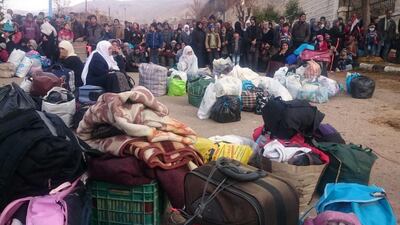GENEVA // The suffering in the Syrian town of Madaya is the worst seen in the country’s war, the United Nations said on Tuesday, a day after delivering aid to the area besieged for months.
“There is no comparison in what we saw in Madaya,” said the UN refugee agency’s chief in Damascus, Sajjad Malik.
He said there were “credible reports” of people starving to death during the months-long siege by pro-regime forces.
Syria’s ambassador to the UN, Bashar Jaafari, said on Monday that there was “no starvation in Madaya” after the medical charity Medecins Sans Frontieres (MSF) said 28 people in the town had starved to death.
A convoy of lorries from the UN, Syrian Red Crescent and International Red Cross (ICRC) delivered emergency food supplies to Madaya on Monday. It was the first aid to reach the area since October.
“There was no life,” said Mr Malik, who was part of the convoy, describing a town of desperate people who in many cases were too weak to voice outrage over their suffering.
Food has been so scarce that people “repeatedly mentioned that a kilo of rice would cost US$300 (Dh1,102)”, he said. One family “sold a motorbike to get five kilos of rice”.
Residents told UN staff that a main source of food in recent weeks had been a soup made of grass boiled with the few available spices.
With no access to electricity, people in Madaya had tried to stay warm by burning cardboard, Mr Malik said, adding: “Whatever we had in the cars, we gave to them.”
As part of its deal with Damascus, the UN has permission to carry out two more aid deliveries to Madaya in the coming days, but timing and details have not yet been agreed with the regime.
Mr Malik said the World Health Organization (WHO) would seek to establish the number of people who had died from starvation in Madaya when UN agencies were allowed back into the area.
He stressed the vital need to sustain aid deliveries through the coming months.
“If we are not able to sustain this ... even the effort we have put in now will be a band-aid,” he said. “We want to make sure that these sieges are lifted.”
Amid the total collapse of health services in the town, WHO said it wants to deploy mobile health clinics to Madaya.
“I sent an immediate request to authorities for more supplies to be brought in. We are asking for mobile clinics and medical teams to be dispatched,” said Elizabeth Hoff, WHO’s representative in Damascus who went into Madaya on Monday.
She said the agency needed to do a “door-to-door assessment” in the town of 42,000 people, where a Syrian doctor had told her that 300-400 people needed “special medical care”.
“I am really alarmed,” said Ms Hoff. “People gathered in the market place. You could see many were malnourished, starving. They were skinny, tired, severely distressed. There was no smile on anybody’s faces. It is not what you see when you arrive with a convoy. The children I talked to said they had no strength to play.”
WHO brought 7.8 tonnes of medicines into Madaya, including trauma kits for wounds and medicines for treating both chronic and communicable diseases, including antibiotics and nutritional therapeutic supplies for children.
“The female doctor said mothers had absolutely no milk for breast-feeding, the milk had dried up and the babies are not satisfied,” Ms Hoff said.
Many malnourished people were too weak to leave their homes.
The UN Security Council met late on Monday to discuss Madaya, along with the besieged Shiite towns of Fuaa and Kafraya, which also received aid on Monday.
“The tactic of siege and starvation is one of the most appalling characteristics of the Syrian conflict,” said New Zealand’s United Nations ambassador, Gerard van Bohemen.
US Ambassador Samantha Power also had strong words about Madaya, slamming the “grotesque starve-or-surrender tactics the Syrian regime is using right now against its own people”.
“Look at the haunting pictures of civilians, including children, even babies, in Madaya,” she told the UN General Assembly.
“These are just the pictures we see. There are hundreds of thousands of people being deliberately besieged, deliberately starved, right now. And these images, they remind us of World War Two.”
* Agence France-Presse, Reuters

